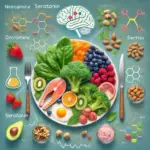Breakfast is often referred to as the most important meal of the day, yet many people skip it or underestimate its significance. Common misconceptions suggest that forgoing breakfast can aid in weight loss or that it simply isn’t necessary if you’re not feeling hungry. However, numerous studies highlight the numerous health benefits linked to eating breakfast regularly. In this article, we will explore the nutritional advantages of starting your day with a healthy breakfast, how it impacts your cognitive function, and its role in weight management and overall health throughout the day. By understanding the importance of breakfast, you’ll be better equipped to make informed choices that will improve your well-being and productivity.
Nutritional Benefits of Breakfast:
Essential Nutrients to Start Your Day:
Breakfast plays a crucial role in providing essential nutrients necessary for overall health. Commonly found nutrients in breakfast foods include proteins, vitamins, minerals, and fiber, all of which contribute to daily energy and well-being.
- Proteins: Vital for muscle repair and growth, proteins can be found in eggs, Greek yogurt, and nut butters.
- Vitamins and Minerals: Fruits and whole grains are excellent sources of vitamins like Vitamin C and minerals like iron. Examples include berries, bananas, and oatmeal.
- Fiber: Important for digestive health, fiber-rich options such as whole-grain toast and chia seed pudding can help keep you feeling full longer.
Impact on Metabolism:
Eating breakfast can significantly influence your metabolic processes. Starting your day with a balanced meal jumpstarts your metabolism, helping the body to burn calories more efficiently throughout the day.
- Thermic Effect of Food: The body expends energy digesting and metabolizing food, known as the thermic effect. Breakfast kickstarts this process, making it particularly important for those looking to manage their weight.
- Enhanced Caloric Burn: Research indicates that consuming breakfast can increase total daily energy expenditure, leading to better calorie regulation.
Incorporating a balanced breakfast into your daily routine not only boosts nutrient intake but also sets the stage for a healthier metabolism.
Cognitive Function and Mental Health
Boosting Memory and Concentration
Research consistently shows that eating breakfast can enhance memory and concentration levels. A study published in the « Journal of Nutrition » found that children who eat breakfast perform better on academic tests compared to those who skip the meal. This improvement is attributed to the essential nutrients provided in the morning meal, which support cognitive functions. Real-life examples illustrate this concept; many professionals report feeling more alert and productive after starting their day with a nutritious breakfast.
Mood Stabilization
Breakfast can significantly impact mood by stabilizing blood sugar levels. When you skip breakfast, your blood sugar can drop, resulting in irritability and fatigue. Studies indicate that people who regularly have breakfast are less likely to experience anxiety and depression symptoms. A balanced breakfast can also trigger the release of neurotransmitters like serotonin, which contribute to feelings of well-being. By prioritizing breakfast, individuals can create a positive start to their day, supporting both mental health and emotional stability.
Weight Management
Breaking the Fast for Weight Control
Many people mistakenly believe that skipping breakfast is an effective way to lose weight. In reality, studies have shown that individuals who eat breakfast regularly tend to maintain healthier weights compared to those who skip this important meal. Research published in the American Journal of Clinical Nutrition indicates that breakfast eaters are less likely to engage in late-night snacking and can better control their hunger signals throughout the day.
Healthy Choices for Sustained Energy
A well-balanced breakfast can prevent unhealthy snacking later in the day. Options that combine proteins, healthy fats, and fibers can provide lasting energy and satiety. For instance:
- Overnight oats: Combining oats, yogurt, fruits, and nuts offers a nutritious start.
- Eggs and vegetables: An omelet loaded with veggies can be both filling and healthy.
- Smoothie bowls: Blend fruits and spinach with nut butter for a quick, nutrient-rich breakfast.
Choosing healthier alternatives over sugary cereals or pastries can aid in weight management while ensuring you remain energized throughout your day.
Long-term Health Benefits
Reduced Risk of Chronic Diseases
Regular consumption of breakfast is closely linked to a lower risk of chronic diseases. Research indicates that individuals who eat breakfast are less likely to develop conditions such as heart disease and diabetes. For instance, a study published in the American Journal of Clinical Nutrition found that those who skip breakfast are 27% more likely to suffer from heart disease compared to their breakfast-eating counterparts. Additionally, data from the Journal of Nutrition suggests that breakfast helps regulate blood sugar levels, reducing the risk of type 2 diabetes.
Increased Longevity
Evidence supports a correlation between healthy breakfast habits and increased longevity. A study from the New England Journal of Medicine revealed that individuals who regularly consume breakfast tend to lead healthier lifestyles and, as a result, may enjoy a longer lifespan. The researchers found that breakfast is often a reflection of overall dietary patterns; those who eat a balanced breakfast are more likely to maintain healthy habits throughout the day.
By incorporating a balanced breakfast into your daily routine, you not only improve your immediate health but potentially extend your life span, making it a vital component of a long, healthy life.
Cultural Variations in Breakfast
Global Breakfast Traditions
Breakfast customs vary significantly from country to country, reflecting local tastes, ingredients, and cultural practices. For instance, in Japan, a traditional breakfast may include rice, grilled fish, and miso soup, providing a balance of carbohydrates, proteins, and healthy fats. In contrast, a typical English breakfast is hearty, featuring eggs, bacon, sausages, baked beans, and toast. These diverse practices not only illustrate the rich cultural tapestry of breakfast but also highlight how different foods can meet nutritional needs and contribute to overall health.
Adapting Breakfast Choices for Individual Needs
Customizing breakfast to fit individual dietary needs is crucial for maximizing its health benefits. For those with gluten sensitivities, gluten-free grains such as quinoa or oatmeal can be excellent choices. Vegetarians and vegans can incorporate plant-based proteins like tofu, nuts, and legumes into their breakfasts. Additionally, many people might not be aware that they can create delicious breakfasts that accommodate lactose intolerance by substituting dairy with almond milk or coconut yogurt. Thoughtful adaptations can help ensure that breakfast remains a nourishing and enjoyable meal for everyone.
Overcoming Breakfast Barriers
Common Reasons for Skipping Breakfast
- Time constraints can make it difficult for many to prioritize breakfast.
- Lack of appetite in the morning often leads people to forgo eating.
- Habitual patterns of skipping breakfast may develop over time.
Solutions to Combat These Barriers
- Quick breakfast options, such as smoothies or overnight oats, can be prepared in advance.
- Meal prepping on weekends allows individuals to have ready-to-eat breakfasts during busy weekdays.
- Incorporating portable foods, like protein bars or yogurt cups, can facilitate breakfast consumption on the go.
Incorporating Breakfast into a Busy Lifestyle
- Time-efficient ideas, such as making egg muffins or wraps, can be nutritious and convenient.
- Suggestions for creating simple, nutritious breakfast routines to establish consistency.
- Utilizing grab-and-go options can ensure you never miss a meal, no matter how hectic your schedule.
Practical Tips for a Healthy Breakfast
Balancing Macronutrients
Creating a balanced breakfast plate is essential for sustaining energy and enhancing overall health. Aim to include:
- Proteins: Eggs, Greek yogurt, or nut butter to promote fullness and muscle health.
- Carbohydrates: Whole grains like oatmeal or whole-grain bread for energy.
- Healthy Fats: Avocado or nuts to support brain function.
Combining these food groups helps ensure a well-rounded meal that provides essential nutrients.
Experimenting with Breakfast Recipes
Encouraging creativity in breakfast choices can lead to more enjoyable and nutritious meals. Consider trying:
- Smoothie Bowls: Blend fruits and greens and top with seeds and nuts for a flavorful boost.
- Overnight Oats: Mix oats with yogurt or milk and let them soak overnight with fruits and nuts for a quick grab-and-go option.
- Veggie Omelettes: Combine your favorite vegetables with eggs for a savory start to your day.
Experimenting with different recipes can keep breakfast interesting and help maintain healthy eating habits.
Conclusion
In this article, we examined the importance of breakfast and its profound impact on health throughout the day. From the nutritional benefits that provide essential nutrients to jumpstart your metabolism, to the significant improvements in cognitive function and mood stabilization, breakfast is undeniably crucial. We explored how proper breakfast consumption aids in weight management, reduces the risk of chronic diseases, and even contributes to increased longevity. Additionally, we acknowledged the cultural variations in breakfast traditions and discussed practical tips for overcoming common barriers to enjoying this vital meal.
We encourage you to reassess your breakfast habits and prioritize this meal for a healthier, more productive day. Share your thoughts or questions in the comments below, and if you’re interested in further reading, explore our related articles on nutrition and healthy eating. Don’t forget to subscribe to our newsletter for continuous updates on health and wellness topics!









